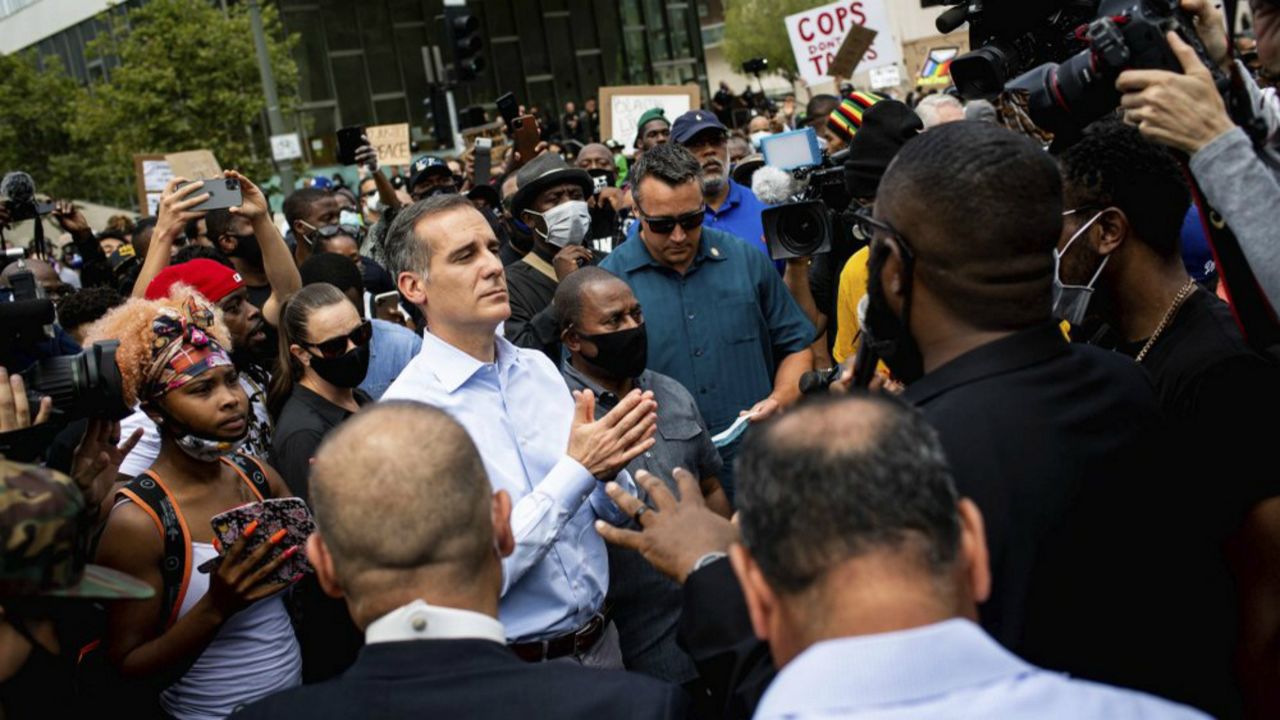LOS ANGELES (AP) — The outrage over George Floyd’s death arrived at Los Angeles Mayor Eric Garcetti’s front door in the form of hundreds of shouting protesters gathered outside his home, loudly chanting to gut funding for the police department.
There was anger about curfews, and the use of rubber bullets by police to disperse protesters. The mayor also heard calls for the resignation of police Chief Michel Moore.
It was the kind of pained, indignant outcry the popular mayor who was born and raised in Los Angeles has rarely seen since taking office seven years ago, much less at the threshold of his home.
Garcetti responded Wednesday by announcing the city would abruptly reverse plans for boosting LAPD’s spending and instead redirect $250 million from the city budget into programs for health care, jobs and “healing” aimed largely at the black community.
The swift turnaround underscored the shifting challenges for LA’s mayor, who took office in 2013 promising to plug potholes and fix sidewalks but has now assumed the roles of peacemaker and consoler-in-chief in a city wracked by racial unrest, an unyielding homeless crisis and fallout from the ongoing coronavirus outbreak.
A two-term Democrat who once harbored hopes of a 2020 presidential run, Garcetti has seen his term recast by forces beyond his control, from Floyd’s death after a white Minneapolis police officer pressed his knee into his neck, to the spread of a virus that prompted him to temporarily shutter much of the city economy and order everyone to wear a face mask.
The sight of heavily armed National Guard soldiers lining the steps of City Hall this week carried symbolic weight, as Garcetti struggled during the weekend to restore order amid violent protests. Angry marchers swarmed the streets, storefronts were smashed, cars left in flames. Thousands were arrested before relative calm returned Tuesday.
Garcetti, the 49-year-old son of former Los Angeles County District Attorney Gil Garcetti, said a “small number” of people were responsible for the damage that prompted him to impose curfews that started Saturday night and continued until Thursday morning.
“We saw people in our city smashing windows, stealing and beating,” Garcetti said Sunday. “We are bigger than that. And I know we are better than that.”
At the start of his first term in 2013, Garcetti talked of paving streets and stoking a post-recession economy. This week he was defending the necessity of the curfews that critics compared to citywide house arrest.
Garcetti’s legacy will be shaped in part by his handling of the racial strife and anger toward police. So far he has stood by Moore, who was ridiculed after equating the actions of those who rampaged through Los Angeles during the weekend with the Minnesota officers charged with killing Floyd. Moore quickly apologized for his comment.
And while Garcetti praises the work of officers he also is showing critics that he has heard their calls for reform. City officials will identify as much as $150 million to slash from the Los Angeles Police Department budget of nearly $2 billion.
It’s a sharp break from Garcetti’s predecessor, Antonio Villaraigosa, who made increasing the size of the department a priority. Garcetti also said the city will impose a moratorium on placing people in a state database for identifying and monitoring gang members.
“There are a lot easier jobs than being mayor of Los Angeles,” Garcetti said during a briefing Tuesday in which sirens could be heard wailing outside City Hall. “You don’t sign up for a job like mayor if you aren’t willing to not only take the heat, but to hear the voices.”
The protests have subsided but the continuing virus outbreak has upended much of what daily life was like in Los Angeles, while the limping economy has left a gaping hole in the budget that is likely to require broad cuts, including at LAPD.
The entertainment industry is crippled. Dodger Stadium is dark. The city’s famous restaurant culture is largely idled, along with live music clubs, gyms and bars. Unemployment in the LA region is nearing 20%. Tourism, an economic driver, has all but vanished.
Robert Stern, former president of the nonpartisan Center for Governmental Studies in Los Angeles, said the only comparable year for the city in recent decades that he could recall would be the unrest of 1968, which witnessed Vietnam War protests, Hispanic student walkouts and the assassination of Democratic presidential candidate Robert F. Kennedy at LA’s Ambassador Hotel.
He said the far-reaching effects of the pandemic and the economic downturn could depress demand for office space, as well as make high-rise living less attractive, chilling the city’s downtown renaissance.
“It’s hard to blame any public official for this. It was way beyond anybody’s imagination,” Stern said. “The whole question is how fast the economy turns around.”
In the early days of his mayoralty, Garcetti positioned himself as a practical problem-solver, following Villaraigosa’s uneven tenure that was punctuated by headlines about his romantic life and partying. “Pave the streets, pick up the litter, fix the sidewalks,” Garcetti said.
While flirting with a presidential run, Garcetti held up LA as a model for the nation and depicted mayors as the workhorses of American government. He predicted that a rail-building boom and construction in advance of the 2028 Olympic Games would change the face of the city.
It wasn’t long ago that Garcetti said he spent virtually all his time working on the city’s vast homelessness problem, which has seen encampments spread across LA and overwhelmed his administration. Then, beginning in mid-March, the virus took hold, prompting the mayor to issue a stay-at-home order that remains in place.
As he seeks to bring calm to the city, he has been cheered and jeered.
“You step forward to hear people’s pain. To try to understand it and never dismiss it, and to try to offer more than a voice forward, but steps forward,” Garcetti said.
“We only have hope, and we only have each other.”
